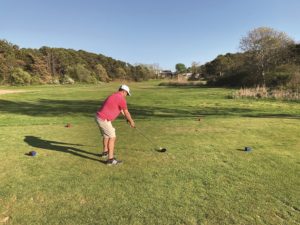There’s a so-called rule, popularized by Malcom Gladwell in his bestseller Outliers: The Story of Success, that it takes 10,000 hours of practice to become an expert at something. The rule has been debunked by many who’ve studied it. All that practice, it turns out, is not necessarily the way to become great at something.
I don’t believe in the 10,000-hour rule for all activities, but I think it might be true for golf.
I played at 12 different courses last year, with the average round lasting about five hours, so that’s 60 hours. At a few courses, I played multiple times. Figuring those rounds in, that would boost my practice time estimate to around 150 hours last year.
When I picked up my clubs last year, I hadn’t played at all for seven or eight years. For the sake of clean data, I think it’s best I count the summer of 2020 as my starting point.

Last month, I went out again for the first time this year, and I feel like those 150 hours, plus a few more played to date, have made me only a few iotas better than I was when I started.
I’ve never played a harder sport.
Basketball was the first sport I loved, and it came naturally to me. Of course, I practiced plenty and continued to improve as I got older, but as a kid playing basketball, it was easy to feel a step ahead of everyone else my age.
Mentally, this is a very different challenge. I’m picking up golf later in life. I’m 25. And I’m finding it hard to compare myself to others. There are people my age who’ve put in a lot more hours than I have. And there are many much older than me who are still scoring better and better. It’s taking me longer to improve at this sport than any other I’ve played.
I’ve also never been more addicted to a sport.
Golf has me itching to play any free time that I have. I’m even passing up opportunities to play basketball to go golfing. That’s a statement I would never have thought of making just a few years ago.
The pandemic changed my sports habits. Pickup basketball was nonexistent for a while, and I had to find new ways to exercise instead of going to the gym. At first, I thought this new sport was just going to be for fun, a stopgap. But over the course of one summer, things changed. Golf became a serious competitive sport that I’m now obsessing over.
I’m not sure what it is exactly that has me feeling this way. Maybe it’s because golf offers so many chances at redemption. I’m watching videos. I’m going to the driving range to try and improve my swing. When I’m on the course, I’m trying to stay in a healthy mental state and focus solely on the club head hitting the ball.
I used to think of golf as a boring, elitist old man’s game. It probably didn’t help that when I was 13, I spent a summer as a caddie at a private course in Brewster called Cape Cod National Golf Club.
Unlike with most sports, in golf each arena you play in is different from the last. Basketball courts, baseball diamonds, and football fields offer the same playing surface, just in a different location. But each golf course is uniquely designed with different challenges that force you to think critically about your game on each hole.
Golf skills seem to progress in parts. At this point, I am somewhat comfortable with putting and hitting fairway irons. Other parts of the game, like driving the ball off the tee or finessing a shot onto the green from a short distance, not so much.
By the end of summer, I calculate I’ll have tacked on another couple hundred hours. Thus begins my pursuit of 10,000 hours of lifetime golf practice.
I’ll report back, but, right now, I have to catch my tee time.



